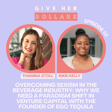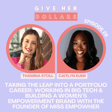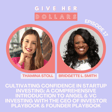
Vote with Your Dollars: Busting ESG Myths & Greenwashing with the Founder of LightMoney
Update: I recently launched my newsletter, The Sheconomist, and would love for you to subscribe: sheconomist.com - I share so many tools and resources that help young, high-achieving women with radical money and career self-advocacy.
----
Did you know that you are probably financing gun manufacturers and deforestation?
In this eye-opening episode, we sit down with Dianna Burkholder, Chartered Socially Responsible Investment Counselor & Founder of lightmoney.com, a game-changing tool that offers unprecedented insight into a company's social impact across six crucial causes: women's empowerment, prison profiteering, dark money, climate change, people over profits, and racial justice.
Diana challenges traditional notions of investment and consumerism, emphasizing the significance of voting with our dollars. What if we could shift the world for the better simply by rethinking where we put our money? We delve into socially responsible investing and how the majority embracing this approach could catalyze incredible societal change.
As we navigate through the complexities of Environmental, Social, and Governance (ESG) criteria, Diana exposes the prevalent misconceptions around ESG scores. Far from assessing a company's positive impact on the environment, social causes, or governance, ESG scores instead measure the financial risk a company faces due to their behavior on these issues. This crucial misunderstanding has significant implications for investors and consumers alike.
Discover how Diana was inspired to create LightMoney.com after realizing that there were no adequate tools to effectively screen companies for socially responsible behavior. We explore the stark reality that many of us unknowingly invest in companies and industries that conflict with our moral values, often through our retirement accounts.
We also discuss the rising trend of shareholder activism that is encouraging corporate transparency and positive change. However, amidst the companies embracing conscious capitalism, Diana cautions us about the increased prevalence of greenwashing.
Don't miss Diana's invaluable advice on tangible actions you can take today to engage in socially responsible investing and understanding where your investments are truly going.
Listen in to learn, reflect, and become an informed consumer and investor, ready to align your financial decisions with your values for a better world.
Links to topics discussed:
- Journalist Susan Antilla who shed light on sexual harassment on Wall Street
- As You Sow Non-profit
- investyourvalues.org



















